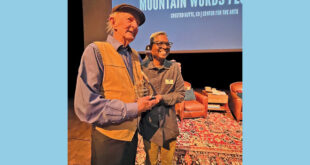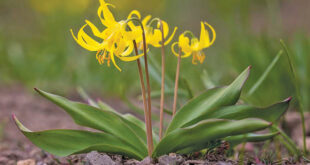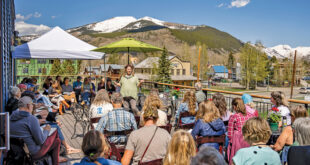Release party at CB Center for the Arts on February 27
by Dawne Belloise
In the literary world, it is most writers’ dream to have their work published by a major house. It’s a rare phenomenon to have that happen with one’s first novel, but that’s what happened with local writer Shelley Read. Read’s debut novel entitled Go as a River was not only picked up by U.S. publishers Spiegel & Grau, but it also went international. A Crested Butte release party will be held this month at the CB Center for the Arts.
Read’s novel first caught the attention of German publishers, who serve the largest reading market in Europe. There, the publishing houses launched into a bidding war for the publishing rights, followed by a similar process in the UK, and then, Read says, it was like dominoes. Other publishers in various countries across the globe began campaigning to Read’s international agent, Susanna Lea. “They write what my agent calls a ‘love letter’ saying why they love the book and how they will represent it and publish it,” says Read. The result has been publishing contracts and translations in over 30 countries. “I’m absolutely flabbergasted. And everyone’s been so lovely to work with. I’m surrounded by incredibly supportive publishers. I’m amazed how many people have such great affection for this book.”
Read has been chipping away at her novel for quite some time, and, although she is publishing her first book in her mid-50s, she always knew she wanted to be a writer. She was educated at the University of Denver where she holds a double major honors BA in English/creative writing and journalism. She went on to earn a master’s degree from Temple University’s Graduate Program in creative writing. She was also a Dean’s Fellow in the Doctoral Program in English at the University of Denver, where she studied 19th and 20th-century world literature and philosophy. On a teaching fellowship at age 22, she realized her love for teaching and the fact that she was good at it.
“It was a way to affect positive change in the world through supporting young people,” she felt. Her dream job came along in 1991 when she was offered a teaching position at Western Colorado University (WCU) in Gunnison, where she taught writing, literature, environmental studies and honors, and was a founder of the interdisciplinary environment and sustainability major and a support program for first-generation and at-risk students. She ended up teaching at WCU for 27 years.
Read has been coming to the Gunnison Valley since she was an infant to visit family, was up on skis in Crested Butte by the time she was three and often went camping up the East River Valley throughout her childhood. She also proudly touts that she’s had her CB PO box since 1985, when she moved to town for summers throughout college and grad school. “I grew up loving this place so much.” Once she settled into the valley for good and began her teaching career, Read found that she had less and less time to write, something she had done somewhat prolifically in her youth, even once turning in a 66-page story in third grade for a two-page assignment. Then she became a mom and with so many responsibilities, her love for writing was put on hold. The irony of cheering on young writers in her university classes when she herself no longer had the time to create didn’t escape her.
But around 2010, the idea that would eventually become Go as a River sparked in Read’s mind and she started making more room to write. A few years later, she says, “I had lots of notes and thoughts that I had jotted down. I had written a lot of short fiction and articles for magazines in my life, but I never really considered myself a novelist until I realized that was indeed what this story was turning into.” With the support of her husband, Erik Forsythe, Read took early retirement from WCU in 2018 to give her full attention to weaving the story of her beloved character Victoria. Although it appears that her novel will be an international sensation, she says it was never her goal. “My only goal was to tell this story. I love this character so much. I’ve lived with her for a very long time. My only goal was to tell her story as best as I possibly could. I didn’t think that far ahead as to where it would go as far as publishing or success. I was immersed in getting the story right.”
The film rights to Read’s book were bought by the film production company of Mazur/Kaplan, whose main business is to bring books to film, concentrating those efforts on adaptations of books they love. They will now partner with a larger film production company and Read notes that it’s going to be a while before any filming begins since there are multiple layers that go into the making of any film. “It’s just in the early stages,” she says but confesses that her head is spinning with all the sudden excitement and publicity around both publication and the film. Her schedule is crowded with meetings and conversations with editors and publicity people all over the world. With her book being translated into 30 languages and sold in 34 different world markets with more to come, Read flew abroad to London, Munich and Amsterdam to publicize and market the book this past December. After her regional U.S. book tour in March and April, she’ll be returning to London in May for more author events and is scheduled for stops in Norway, Sweden, Denmark, Finland and Germany as well.
With the book generating so much interest, Read can only speculate that its success is due to the story’s universal themes. “It’s the story of finding strength and resilience that we don’t know we have until we have to bear the unbearable. It’s about place, displacement, prejudice and where to turn in the face of loss. It’s a novel about the humility and empowerment we can find in the natural world and in wild landscapes. Those are very universal themes people might be craving in these uncertain times,” she explains. She also believes the history and setting—based on real events in the Gunnison Valley and the creation of Blue Mesa Reservoir—are widely intriguing to readers. From her website shelleyread.com, the book is summarized in the words of her U.S. publisher:
“Set amid Colorado’s wild beauty, a heartbreaking coming-of-age story of a resilient young woman whose life is changed forever by one chance encounter. A tragic and uplifting novel of love and loss, family and survival – and hope. Seventeen-year-old Victoria Nash runs the household on her family’s peach farm in the small ranch town of Iola, Colorado – the sole surviving female in a family of troubled men. Wilson Moon is a young drifter with a mysterious past, displaced from his tribal land and determined to live as he chooses.” A chance encounter between Victoria and Wil profoundly alters both of their young lives, and when tragedy strikes, “Victoria leaves the only life she has ever known, fleeing into the surrounding mountains where she struggles to survive in the wilderness. As the seasons change, she also charts the changes in herself, finding in the beautiful but harsh landscape the meaning and strength to move forward and rebuild all that she has lost, even as the Gunnison River threatens to submerge her homeland—its ranches, farms and the beloved peach orchard that has been in her family for generations.”
Spiegel & Grau have already bought the rights to Read’s next book, which she’s currently working on. It’s not a sequel, and she says writing this new novel will require much more focus. “It’s a very different experience than the first book. Now, for the first time ever, I have to sit down to write a novel all at once. I learned how to write a novel by writing one. So I’ll need to bring all that I’ve learned into writing this second one.” Her second novel is also set in Colorado.
As a fifth generation Coloradan, Read grew up hearing stories of her various great-great grandparents and their plight to homestead on the Eastern plains in the 1800s, followed by her great grandparents and grandparents, who she knew well, who also farmed and ranched and, eventually urbanized in Colorado Springs. “They were incredibly tough, they didn’t have money and nothing was set up for them,” she tells of their sheer determination to carve out a place for themselves. “I’m so appreciative of how hard my ancestors worked to make a home in Colorado. The women, especially, are tough as hell and stepped up every day to do what needed to be done,” and Read feels she draws much of her strength from those ancestors. She applied that strength to completing her book, and now she must turn that wherewithal to navigating that novel’s unexpected success. “I just take this whole wild ride one day at a time. I’m in such a new world. I’ve been in academia all my professional life and I’m in new waters, learning every day. More than anything, I am so incredibly grateful.”
 The Crested Butte News Serving the Gunnison Valley since 1999
The Crested Butte News Serving the Gunnison Valley since 1999





